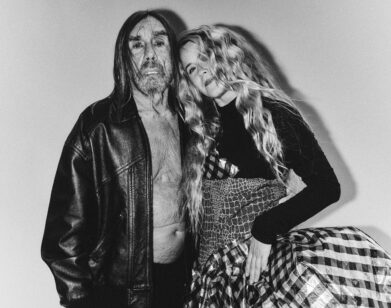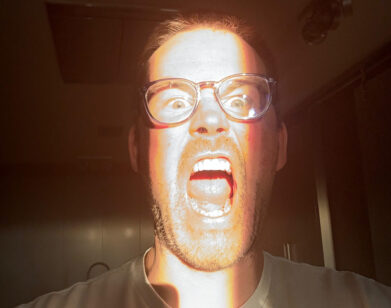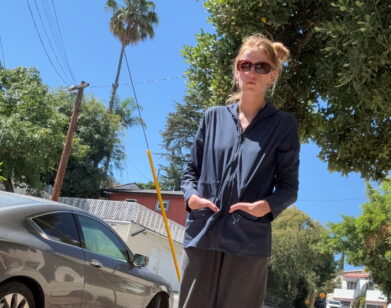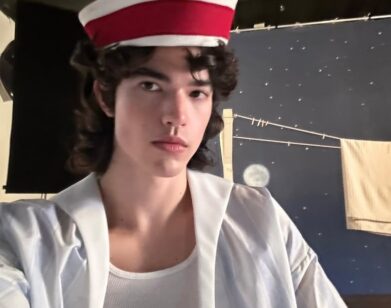Anna, Not Abba

Anna Ternheim is tall and blonde but the Swedish stereotypes end there. She’s far harder to categorize that that: Some of her songs are unadorned and showcase her striking voice, others are more fully orchestrated; or have jaunty disco beats. Her album Leaving on a Mayday (Verve), due out August 11, was produced by Bjorn Yttling, the middle man of Peter, Bjorn, and John. The songs are marked by expressive melodies and bittersweet lyrics. The irrepressible opening track, “What Have I Done,” has a sweeping sound and a propulsive beat, “My Heart Still Beats For You” is spare and wistful. We met before her show at Joe’s Pub, where she rearranged some of the new material, in some cases harmonizing with three women, or singing accompanied by nothing more than a man playing a saw. There we talked about the Swedish scene, writing lyrics in your second language, and why music makes cities smaller.
DAVID COGGINS: You’ve played at Joe’s Pub before. I saw you perform this spring-but you weren’t supported by a band then.
ANNA TERNHEIM: Right, I was playing alone with just an iPod. It was a tour with El Perro Del Mar.
DC: Another Swedish musician. You’re playing into the stereotype that all musicians from Sweden know each other.
AT: Well it is a small country. All cities seem small after a while. I was hanging out at a rehearsal hall in Williamsburg and I don’t know how many people I ran into just being there for a couple days. Music makes all cities smaller.
DC: The new record is produced by Bjorn from Peter, Bjorn, and John. And it’s a new sound for you.
AT: Yes, I wanted to do some new things. We didn’t compromise. He produced and I wrote the songs and things were really smooth. That doesn’t always happen but it went quickly and we went with the flow. It’s always like that the first time you work with someone. There’s a certain energy and you’re feeling each other out.
DC: What happens the second time?
AT: I don’t know. It’s easier and harder. You have something to look back on; you know each other; you could go further with things you discovered in the first recording. But also you have to fight not doing the same thing all over again.
DC: When you talk about not compromising making this record what do you mean?
AT: Well, I contacted Bjorn and wanted to make something very simple with a few elements that was built around my vocals. And my last record was more driven by big arrangements and chords and pop structures. It was a different way of writing songs and working. I wanted to build it around the voice and the words. And we decided on drums and strings and kept the team pretty small.
DC: Do you write in a particular way? Do you have to be in a private place, like an island off Stockholm, or can you write wherever you are?
AT: I work in bits and pieces. When I’m touring it’s difficult. After touring, when I have space and time, it’s a process, something I’ve been doing since I was 10 or 11 years old. I collect lyrics, melodies, bits and pieces, and finally it all comes together. It’s hard to say—I’ve been trying to figure out how the process works.
DC: What is it like touring in Sweden as opposed to playing in New York?
AT: I haven’t played here that much, it’s like I’m starting all over, turning back time ten years and playing clubs and small places. There’s so much talk about Swedish musicians: “Do we know each other?” “Where do all the girls come from?” I heard the same thing in Germany: “I especially like Swedish singer-songwriters.” There are scenes everywhere. A lot of the bands who tour over here work independently with their music but are somehow connected and if one goes somewhere it’s easy to follow. We help each other out.
DC: You’re going back in a few days.?
AT: I have a longer history there. Coming here is like seeing what I do with new eyes. There have been people in Sweden who have seen me for years. The lyrics are perceived differently—people speak English but are not native speakers.
DC: Can you talk about singing lyrics in your second language?
AT: I make all kinds of mistakes. It makes you brave in a way you’re not aware of. You say things in very blunt ways or direct ways. It sets your mind free because you don’t have a history with the language. You have to use the most direct way of communication, which is saying what you want to say in the way you can. I tried writing a song in French once and I don’t speak a lot of French and I can’t say more than, “I love you, I love you. Je t’aime.”






